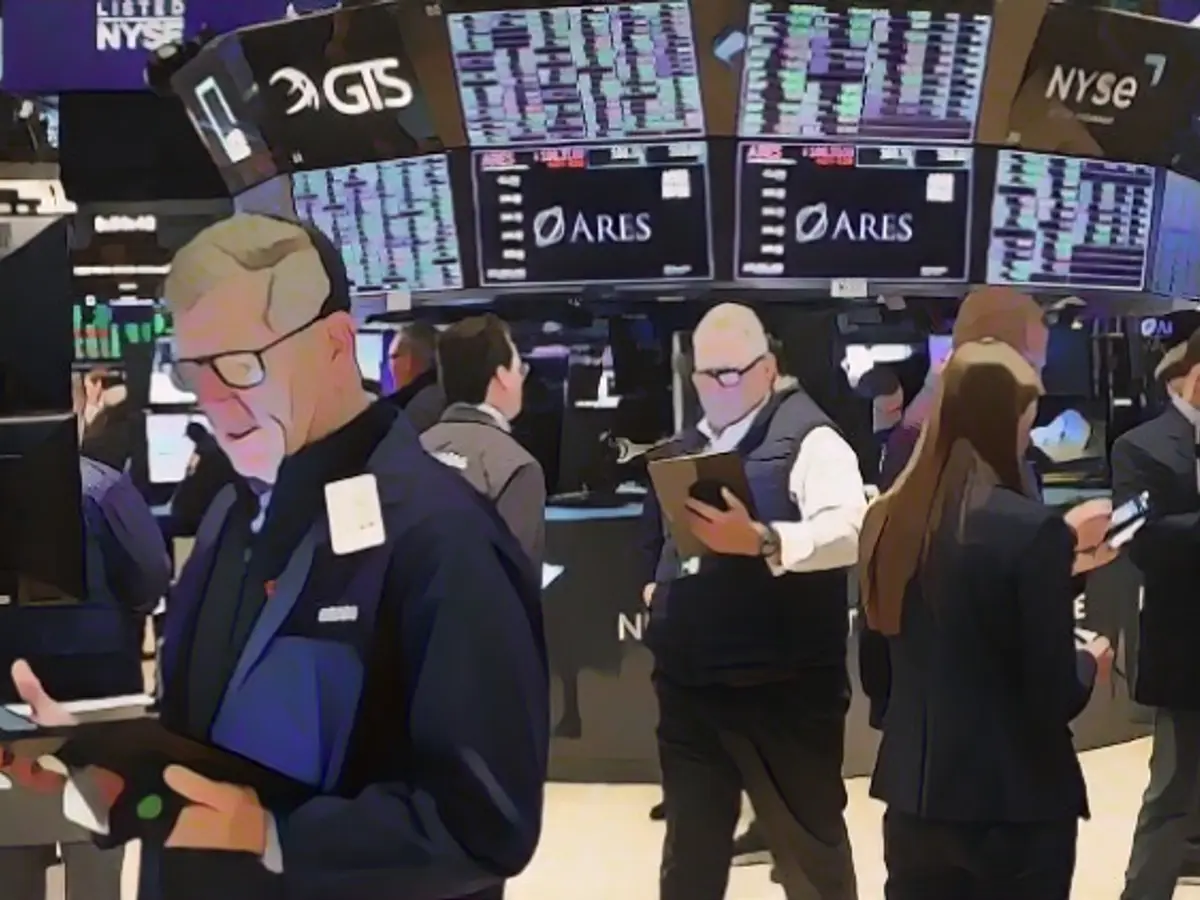Stock Market Slows Down, Inflation Data Steers Investors
The stock market, which had been on an upward trajectory for weeks, seems to be stalling. The positive U.S. inflation data has given investors newfound optimism, but the anticipated meeting between President Biden and Chinese leader Xi Jinping isn't expected to make much impact.
After the recent significant gains, Wall Street showed little movement. The Dow Jones index dropped by 0.1%, closing at 34,945 points. The S&P 500 and the Nasdaq Composite each rose by a mere 0.1%. A total of 1,086 stocks saw price gains, while 1,761 experienced losses. Traders noticed a gradual thinning of the air, following the rapid surge of the past few weeks.
The inflation data strengthened investors' faith that the Fed might abstain from another rate hike. The data also bolstered expectations that the Fed could lower rates in May 2023. The news of a rise in weekly initial jobless claims was met with concern, indicating a weakening labor market. However, this development also bolstered the hope that the U.S. Federal Reserve could soon wrap up its interest rate hikes.
The situation in U.S. industry improved slightly more than expected in the Philadelphia region in November. Industrial production declined slightly less than forecast in October compared to the previous month. U.S. import prices dropped for the first time in six months in October, suggesting that inflationary pressures might be easing.
Cisco Systems Takes a Hit
Shares in Cisco Systems fell by 9.9% after the network equipment provider lowered its sales forecast for the current year. Despite surpassing analysts' estimates for sales and profits in the first quarter, the company's sales forecast was a significant disappointment.
The Anticipated Biden-Xi Meeting Falls Short
The much-awaited meeting between U.S. President Joe Biden and Chinese leader Xi Jinping, however, did not provide any impetus. The two leaders merely agreed to resume military communication.
The U.S. Dollar Remains Stable
The U.S. dollar's performance remained largely unchanged. The stronger than expected rise in initial claims offered investors another reason to believe that the interest rate hikes, which have bolstered the dollar, are drawing to a close.
Oil Prices Plummet
Oil prices plummeted sharply. Higher-than-anticipated U.S. crude oil inventories from the previous day served as a catalyst. There were also concerns about China's weak demand.
Walmart and Alibaba Struggle
Yields on the bond market showed some recovery from their previous day's losses. Despite lower-than-expected U.S. inflation data, labor market data and import prices now support bond prices. The yield on ten-year securities dropped by 8.1 basis points to 4.45%.
Walmart shares tumbled by 8.1%. Although the U.S. retail giant posted better-than-expected sales and earnings in the third quarter, its full-year forecast left investors dissatisfied. Alibaba shares sank by 9.1%. The Chinese e-commerce giant reported increased revenue and returned to profitability in the second quarter. However, the planned spin-off of the cloud division faced rejection due to the Biden administration's recent export control measures on advanced chips and semiconductor equipment.
Cybersecurity Company Palo Alto Networks Records Losses
Palo Alto Networks shares fell by 5.4%. The cybersecurity company's first-quarter earnings and revenue exceeded market expectations. However, forecasts for the current quarter and the 2024 financial year lagged behind expectations.
The Wall Street Dow Jones index, a key indicator of the stock market's performance, closed lower, reflecting a pause in the market's upward trend. Despite this, the positive inflation data strengthened investors' belief that the Federal Reserve might postpone another interest rate hike.
The U.S. dollar's performance showed little change, with investors speculating that the interest rate hikes supporting the dollar might be coming to an end.
Source:
Additional Insights from Enrichment Data:
- The Dow Jones, S&P 500, and Nasdaq experienced significant gains prior to this period, with the Dow Jones reaching a record high of 35,766 points, and the S&P 500 and Nasdaq Composite recording gains of 0.9% and 1.4%, respectively, according to a NY1 report from February 13, 2025[5].
- Inflationary pressures have been a concern for some time, with the imposition of tariffs by former President Trump leading to increased Treasury yields. This trend was especially noticeable in the aftermath of the steel tariffs, causing the 10-year Treasury yield to surge to 4.54% on February 11, 2025[1].
- Trade tensions between the U.S. and China have persisted, with President Trump imposing tariffs on Chinese imports that are set to go into effect on February 1, 2025, and a 25% tariff on goods from Canada and Mexico[3]. China has responded strategically to these tariffs, escalating trade tensions further and impacting industries like the automotive sector.
- A number of individual companies have performed well during this period. Cisco Systems, for example, reported better-than-expected profits, driven by strength in its range of products, including artificial intelligence infrastructure. MGM Resorts International also saw a significant increase in profits, thanks to growth in China and positive trends in its Las Vegas and North American digital businesses[5]. GE HealthCare Technologies also reported profits that surpassed expectations, acknowledging the impact of tariffs in its forecasts.
- The overall market outlook remains mixed, with analysts warning about the risk of concentration of capital in technology stocks, particularly in companies like Nvidia. The potential for severe shocks similar to those caused by DeepSeek’s AI technology is a cause for concern. However, earnings growth is expected to reach 11% in 2025, driven by strong economic growth and steady earnings, according to Goldman Sachs.








